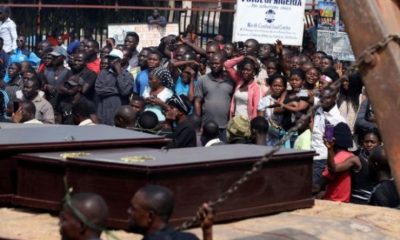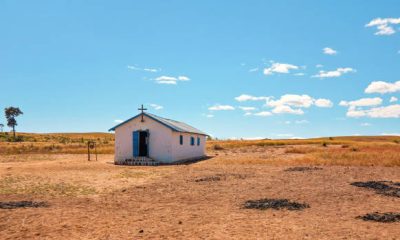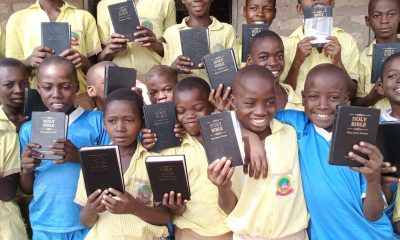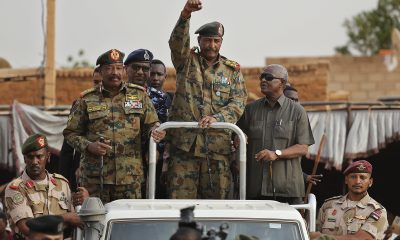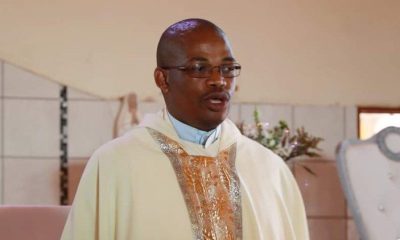world news
90% of the 5,500 Christians Killed in 2022 Were Nigerian

Nigeria – Of the 5,500 Christians who were killed last year because of their faith, 90 percent were Nigerian, according to Crux and the International Society for Civil Liberties and Rule of Law (Intersociety), an NGO headquartered in Eastern Nigeria. Additionally, Intersociety reported that over the past 14 years, 52,250 people have been killed in Nigeria for their Christian faith.
Nigeria’s Constitution “forbids the federal and state governments from establishing a state religion, forbids religious prejudice, and guarantees people’s right to freely choose, practice, spread, or modify their faith,” says Crux.
While this declaration may seem outwardly beneficial for Christians, Megan Meador from Alliance Defending Freedom said her organization has “had cases where Christians have been hauled in front of Sharia courts, without jurisdiction, and accused of crimes like apostasy, which is not supposed to be a crime in Nigeria.”
The danger Christians face in Nigeria ranges from individual to family, community, and government. Despite its efforts, as proven through the constitution, Nigeria fails to protect its population of approximately 108.3 million Christians, roughly half of its total population.
These facts contribute to ICC’s push for the United States to designate Nigeria as a Country of Particular Concern in its upcoming religious freedom designations for 2023.
Over the past twenty years specifically, Nigeria has faced increased violence against Christians, particularly in the northern region of the country. Despite its apparent lack of recognition in the United States due to a failure to designate it as a Country of Particular Concern, Nigeria is widely regarded as the world’s worst persecutor of Christians.
Sources:persecution
world news
കാനഡയിൽ വിദേശ വിദ്യാർത്ഥികൾക്ക് പുതിയ നിബന്ധനകള്; ജോലി സമയം ആഴ്ചയിൽ 24 മണിക്കൂർ മാത്രം

വിദേശ വിദ്യാർത്ഥികൾക്ക് ഇനി മുതൽ ആഴ്ചയിൽ 24 മണിക്കൂർ മാത്രമേ ജോലി ചെയ്യാൻ അനുവാദമുള്ളൂവെന്ന് കുടിയേറ്റ, അഭയാർഥി, പൗരത്വ വകുപ്പുമന്ത്രി മാർക്ക് മില്ലർ അറിയിച്ചു. എക്സിലുടെയാണ് മാർക്ക് മില്ലർ ഇക്കാര്യം അറിയിച്ചത്. ആഴ്ചയില് 20 മണിക്കൂര് മാത്രം ജോലി എന്ന വ്യവസ്ഥയില് ഇതുവരെ ഇളവ് അനുവദിച്ചിരുന്നത് കൊവിഡ് സാഹചര്യത്തെ തുടർന്നുള്ള താൽക്കാലിക നടപടി ആയിരുന്നുവെന്നും മാര്ക്ക് മില്ലര് വ്യക്തമാക്കി.
കൊവിഡ് സാഹചര്യത്തെ മുൻനിർത്തിയാണ് അന്താരാഷ്ട്ര വിദ്യാർത്ഥികൾക്ക് 20 മണിക്കൂർ മാത്രം ജോലി ചെയ്യാം എന്ന വ്യവസ്ഥയിൽ ഇളവ് നല്കി കൂടുതല് സമയം അനുവദിച്ചിരുന്നത്. ഇന്നു മുതൽ ഈ വ്യവസ്ഥ തുടരാൻ കഴിയില്ലെന്നും അദ്ദേഹം പറഞ്ഞു. വിദ്യാർത്ഥികളുടെ ജോലി സമയം ആഴ്ചയിൽ 24 മണിക്കൂറായി പരിമിതപ്പെടുത്തുന്നുവെന്നും അദ്ദേഹം എക്സിൽ കുറിച്ചു.
എങ്കിലും വിദ്യാർത്ഥികൾക്ക് നേരത്തെ ഷെഡ്യൂൾ ചെയ്ത ജോലികൾ തുടരാം എന്നും മില്ലർ പറഞ്ഞു. കൂടാതെ ഈ പരിഷ്കാരം വിദ്യാർത്ഥികൾക്ക് സഹായകമാകുമെന്നും ദീർഘനേരം ജോലി ചെയ്യുന്നതിനുപകരം പഠനത്തിൽ കൂടുതൽ ശ്രദ്ധ കേന്ദ്രീകരിക്കാൻ സാധിക്കുമെന്നും അദ്ദേഹം ചൂണ്ടിക്കാണിച്ചു.
ആഴ്ചയിൽ 28 മണിക്കൂറിൽ കൂടുതൽ ജോലി ചെയ്യുന്ന വിദ്യാർത്ഥികൾ പഠനത്തിൽ മോശം പ്രകടനമാണ് കാഴ്ചവയ്ക്കുന്നത് എന്ന് അടുത്തിടെ യുഎസിലും കാനഡയിലും നടത്തിയ പഠനത്തിൽ വ്യക്തമായിരുന്നു. 24 മണിക്കൂറിൽ അധികം ജോലി ചെയ്യാൻ അവസരം നൽകുന്നത് അവരുടെ പ്രോഗ്രാമിൽ വിദ്യാർത്ഥികളുടെ എണ്ണം കുറയാൻ കാരണമാകും എന്നും കാനഡ ഗവൺമെന്റ് അവകാശപ്പെടുന്നു.
ഇതേതുടർന്ന് വിദേശ വിദ്യാർഥികളെ സ്വാഗതം ചെയ്യുന്ന പല രാജ്യങ്ങളും ജോലി സമയത്തിൽ നിയന്ത്രണമേർപ്പെടുത്താൻ തീരുമാനിച്ചിട്ടുണ്ട്. വിദ്യാർത്ഥികൾക്ക് രണ്ടാഴ്ച 48 മണിക്കൂർ ജോലി ചെയ്യാനുള്ള നയം ഇതിനോടകം ഓസ്ട്രേലിയയും പരിഷ്കരിച്ചു.
Sources:globalindiannews
world news
സുഡാനിൽ ക്രൈസ്തവർക്ക് നേരെ പീഡനങ്ങൾ കടുപ്പിച്ച് സൈനികർ

സുഡാനിൽ മൂന്നു ക്രൈസ്തവരെ അവരുടെ വിശ്വാസത്തിന്റെ പേരിൽ തടവിലാക്കുകയും ആഴ്ചകളോളം പീഡിപ്പിക്കുകയും ചെയ്തതായി റിപ്പോർട്ട്. സുഡാൻ ആംഡ് ഫോഴ്സ് (എസ്.എ.എഫ്.) സൈനികർ പ്രദേശവാസിയായ ക്രൈസ്തവരിൽ ഒരാൾ ബൈബിൾ കൈവശം വച്ചതായി കണ്ടെത്തിയതിനെ തുടർന്നാണ് അയാളെയും സുഹൃത്തുക്കളെയും തടവിലാക്കിയത്. സൈന്യത്തിന്റെ ആക്രമണത്തിന് ഇരയായവരിൽ ഒരാളായ ഹംസ ഹാറൂൺ അഹമ്മദ് ഇപ്പോഴും പരിക്കേറ്റ് ചികിത്സയിലാണ്.
ആക്രമണത്തിന് ഇരയായവർ ദക്ഷിണ സുഡാനിലെ യുദ്ധ പശ്ചാത്തലത്തിൽ അവിടെനിന്നും കുടുംബങ്ങളെ സുരക്ഷിത സ്ഥാനത്തേക്ക് മാറ്റാനുള്ള ശ്രമത്തിനിടയിലാണ് സൈന്യത്തിന്റെ പിടിയിലായത്. “ഇത് ആരുടെ ബൈബിൾ ആണ്?” എന്ന് ചെക്ക് പോയിൻ്റിലെ പരിശോധനയ്ക്കു ഇടയിൽ ഒരു മുസ്ലീം സൈനികൻ അവരോട് ചോദിച്ചു. അറബി ഭാഷയിലുള്ള ബൈബിൾ തന്റെ ബാഗിൽ ഉണ്ടായിരുന്നതിനാൽ തന്റെ ബൈബിൾ ആണെന്ന് അഹമ്മദ് സമ്മതിച്ചു. എന്നാൽ അദ്ദേഹത്തിന്റെ രണ്ട് കൂട്ടാളികളും, അടുത്തിടെ ഇസ്ലാമിൽ നിന്ന് പരിവർത്തനം ചെയ്തവരും, അദ്ദേഹത്തെ തനിയെ ജയിലിൽ അയക്കാൻ സമ്മതിക്കാതെ ജയിലിലേക്ക് പോകുകയായിരുന്നു.
തുടർന്ന് ഈ മൂന്ന് ക്രിസ്ത്യാനികളെയും സൈന്യം ജയിലിൽ അടയ്ക്കുകയും കഠിനമായി പീഡിപ്പിക്കുകയും ചെയ്തു. ചോദ്യം ചെയ്യലിനിടെ മുസ്ലീം സൈനികരിലൊരാൾ മരത്തടികൾ കൊണ്ട് തല്ലി അഹമ്മദിന്റെ വലതുകൈ ഒടിഞ്ഞു. “നിങ്ങളുടെ ഈ പുസ്തകം കാരണം നിങ്ങൾ രാജ്യത്ത് ആശയക്കുഴപ്പം സൃഷ്ടിച്ചു. ഇപ്പോൾ നിങ്ങൾ കൂടുതൽ നാശമുണ്ടാക്കാൻ പോകുന്നു” സൈനികരിൽ ഒരാൾ പറഞ്ഞു.
2023 ഏപ്രിലിൽ ആണ് പാരാമിലിട്ടറി റാപ്പിഡ് സപ്പോർട്ട് ഫോഴ്സും (RSF) സുഡാൻ ആംഡ് ഫോഴ്സും (SAF) തമ്മിൽ സുഡാനിൽ പോരാട്ടം പൊട്ടിപ്പുറപ്പെട്ടത്. 2021 ഒക്ടോബറിലെ അട്ടിമറിയെത്തുടർന്ന് സുഡാനിൽ സൈനിക ഭരണം പങ്കിട്ട ആർ.എസ്.എഫും എസ്.എ.എഫും തമ്മിലുള്ള സംഘർഷം കാർട്ടൂമിലെയും മറ്റിടങ്ങളിലെയും സാധാരണക്കാരെ വളരെയധികം ബാധിച്ചു. സംഘർഷത്തിൽ 14,600-ലധികം ആളുകൾ മരിക്കുകയും രാജ്യത്തിനകത്തും പുറത്തുമായി എട്ടു ദശലക്ഷം ആളുകളെ മാറ്റിപ്പാർപ്പിക്കുകയും ചെയ്യേണ്ടി വന്നു.
Sources:azchavattomonline.com
world news
ദക്ഷിണാഫ്രിക്കയിൽ വൈദികർക്കെതിരായ അതിക്രമം തുടരുന്നു: അജ്ഞാതമായ സാഹചര്യത്തിൽ വൈദികൻ കൊല്ലപ്പെട്ടു
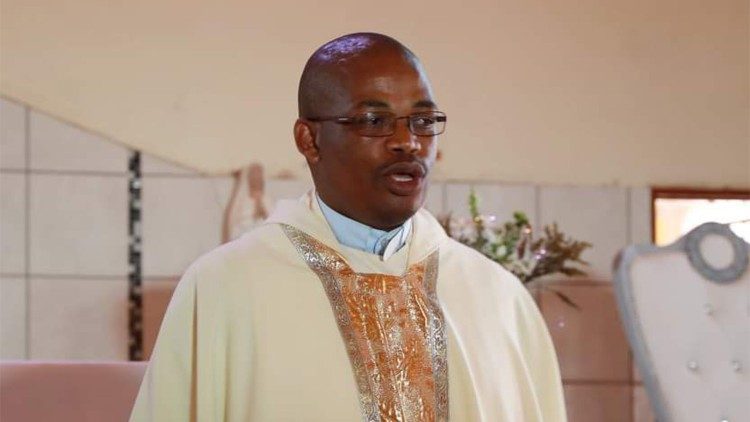
ദക്ഷിണാഫ്രിക്കയിലെ പ്രിട്ടോറിയ നഗരത്തിൽ വൈദികൻ വെടിയേറ്റ് കൊല്ലപ്പെട്ടു. പോൾ ടാറ്റു എന്ന വൈദികനെയാണ് അജ്ഞാതമായ സാഹചര്യത്തിൽ കൊല്ലപ്പെട്ട നിലയിൽ കണ്ടെത്തിയത്. ദക്ഷിണാഫ്രിക്കയിൽ കുറച്ചു നാളുകളായി വൈദികർക്കെതിരായി തുടരുന്ന അതിക്രമങ്ങളിൽ ഏറ്റവും പുതിയതാണ് ഈ സംഭവം.
പുരോഹിതന്റെ മരണം ഒരു ഒറ്റപ്പെട്ട ഒരു സംഭവമല്ല, സൗത്ത് ആഫ്രിക്കയിലെ സുരക്ഷിതത്വത്തിന്റെയും ധാർമ്മികതയുടെയും വഷളായ അവസ്ഥയുടെ അസ്വസ്ഥജനകമായ ഉദാഹരണമാണ് ഇത് എന്ന് ദക്ഷിണാഫ്രിക്കയിലെ ബിഷപ്പുമാരുടെ കോൺഫറൻസ് സംഭവത്തോട് പ്രതികരിച്ചു. ഈ വർഷം മാർച്ചിൽ യുവ പുരോഹിതനായ ഫാ. വില്യം ബാൻഡയെയും കൊലപ്പെടുത്തിയിരുന്നു.
ഫാദർ ടാറ്റുവിന്റെ മൃതസംസ്കാര ചടങ്ങുകളുടെ വിശദാംശങ്ങൾ വരും ദിവസങ്ങളിൽ അറിയിക്കുമെന്നും ബിഷപ്പ് കോൺഫറൻസ് അറിയിച്ചു. വൈദികനെ കൊലപ്പെടുത്തിയത് ആരാണെന്നും കൊലപാതകത്തിന്റെ കാരണവും ഇപ്പോഴും അജ്ഞാതമാണ്. അദ്ദേഹത്തിന്റെ വാഹനത്തിനുള്ളിൽ തന്നെയാണ് മൃതദേഹം കണ്ടെത്തിയത്.
Sources:azchavattomonline.com
-

 us news10 months ago
us news10 months agoനോർത്ത് അമേരിക്കൻ പെന്തക്കോസ്തൽ റൈറ്റേഴ്സ് ഫോറം : രാജൻ ആര്യപ്പള്ളി പ്രസിഡന്റ്; നിബു വെള്ളവന്താനം സെക്രട്ടറി
-
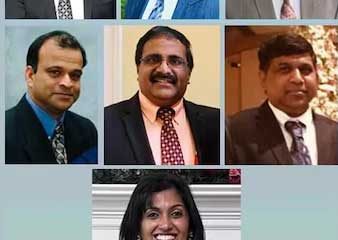
 us news8 months ago
us news8 months agoനോര്ത്ത് അമേരിക്കന് പെന്തക്കോസ്തല് റൈറ്റേഴ്സ് ഫോറം; അറ്റ്ലാന്റാ ചാപ്റ്ററിന് പുതിയ ഭാരവാഹികള്
-
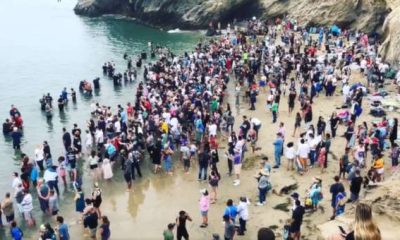
 us news11 months ago
us news11 months ago‘The Biggest Water Baptism in History’: 4,166 Baptized at Historic Beach from Jesus Movement
-

 world news11 months ago
world news11 months agoMuslim Husband Found Out His Wife Became a Christian; He Beat Her, Starved Her and Left Her in a Wild Animal Park—But God…
-
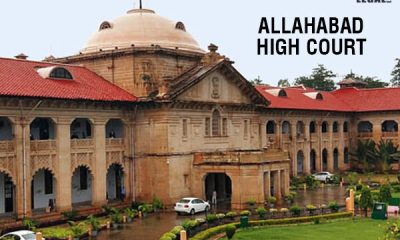
 National8 months ago
National8 months agoബൈബിൾ വിതരണം ചെയ്യുന്നതും നല്ല മൂല്യങ്ങൾ പഠിപ്പിക്കുന്നതും മതപരിവർത്തനമല്ല: അലഹബാദ് ഹൈക്കോടതിയുടെ നിര്ണ്ണായക വിധി
-

 world news9 months ago
world news9 months ago37 Christians Killed in Nigeria in Three Weeks
-
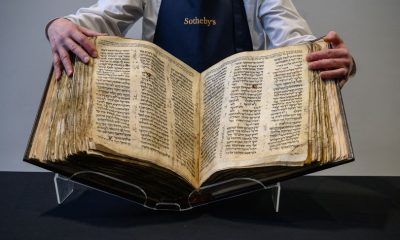
 world news12 months ago
world news12 months agoലേലത്തിൽ വെച്ചിരുന്ന ലോകത്തിലെ ഏറ്റവും പഴക്കമുള്ള ഹീബ്രു ബൈബിളിന് റെക്കോര്ഡ് തുക: ലഭിച്ചത് 314 കോടിരൂപ
-
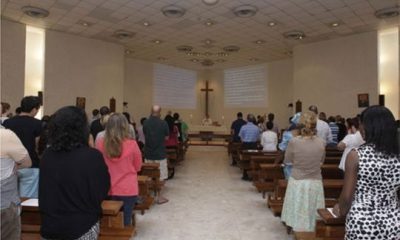
 world news11 months ago
world news11 months agoയുഎഇ യിൽ ക്രൈസ്തവ ആരാധനാലയങ്ങൾക്ക് ഇനി ലൈസൻസ് നിർബന്ധം

